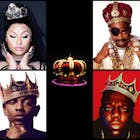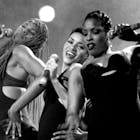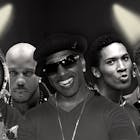
Hip-Hop Isn't a "Young" Genre—We Just Treat It Like a Child
Hip-Hop Isn't a "Young" Genre—We Just Treat It Like a Child
Published Mon, February 28, 2022 at 4:00 PM EST

Well...you know Hip-Hop is still such a young genre..."
- Some Guy Somewhere, Probably
It's one of those statements that you've heard a thousand times—perhaps you've even said it yourself:
"Hip-Hop is a young genre..."
Usually that statement is meant one of two ways: that Hip-Hop is music that is explicitly for the youth, or that Hip-Hop, as a genre of music, is still in it's relative youth. Both are very common ways of looking at this culture and music—and both are, at this point, wrong as hell. It's logistically and factually incorrect to still consider Hip-Hop in it's infancy, relative or no. If our measuring stick for musical or cultural "age" is other popular musical genres and cultures, the argument just doesn't work when you hold it up to the light.
Since the beginning of recorded sound, there isn't another genre of popular music that we still considered "young" four decades after its initial recordings. The earliest rap records happened in the late 1970s—and there was a robust culture bubbling in New York City for almost a decade prior to that. If we were to cite Jackie Brenston's 1951 hit "Rocket 88" as the first rock 'n roll record, well—who was still calling rock'n roll "young" in 1991? Was anyone still viewing that genre as in it's infancy four decades after that Ike Turner-penned hit topped the R&B charts? Was there anyone still speaking about jazz as a young phenomenon by the time Miles Davis and Thelonious Monk were breaking hard bop in the 1950s—decades after musicians like Freddie Keppard, the Versatile Four and Wilbur Sweatman were making strides towards the first jazz recordings in the 1910s; decades after the advances of the 1920s and 30s "Jazz Age" or the early 1940s Big Band Era?
We've witnessed just as much expansion and evolution in Hip-Hop. We've seen everything from the discofied grooves of Sugarhill and Enjoy Records to the early electro innovations of artists like Mantronix and Soulsonic Force. We've watched Def Jam storm the mid-1980s with stripped down, trunk-rattling beats; and by the end of that decade, saw a generation of producers fall in love with James Brown samples. In the mid-1990s, G-Funk put Parliament-Funkadelic-inspired bass grooves into the mix, as artists out of the South like UGK and the Dungeon Family pushed into even more soulful territory.
And that's just the first 15 or so years of Hip-Hop music. We haven't even gotten to crunk, trap and drill. Haven't touched international artists and scenes. We haven't even mentioned Dilla, bruh.
Beyond sonic shifts, we've seen this culture become entrenched in the socio-political experiences of at least two generations. Rappers have gone from making songs about apartheid to rapping their support for NYC Mayor David Dinkins, shouting out the Million Man March, assessing Y2K and September 11, celebrating President Barack Obama and calling out Donald Trump. All of that history that has unfolded on Hip-Hop's watch and we still believe this is still a relatively "new" thing. We let the fact that rap showed up decades after rock and R&B distract us from the fact that this culture was born when Nixon was still in office and The Mary Tyler Moore Show was still in the Nielsen Top Ten. That's a while ago now.
Hip-Hop is a barometer and influencer for pop culture. We've gone from Big Bank Hank referencing Superman to Kendrick Lamar doing the soundtrack for Black Panther; rap is in 80s Fruity Pebbles commercials and 90s GAP commercials and Travis Scott has his own Happy Meal today. That's decades of shaping Madison Avenue, cross-generational influence.
Virtually every post-WWII genre of music was dismissed as undignified, unartistic noise and/or kids' stuff initially. Jazz, blues, and rock & roll all had to suffer through that fight for legitimacy when it was their turn to challenge the status quo. What's unique about Hip-Hop and rap music is that it's been waiting in the proverbial hallway for it's chance to sit at the front of the cultural prestige line far longer than other genres did. Even as Hip-Hop went mainstream by the late 1980s and dominated popular culture by the late 1990s, it was seen as music that wasn't supposed to be in the spot it had suddenly attained. It wasn't just that elders bemoaned this music (that had always happened), it's that the purveyors of this music weren't passed the keys to the kingdom by an industry still worshipping at the lucrative altar of classic rock.
Rock nostalgia has been big business since the 1970s. That's around the same time that the music industry began recognizing that rock 'n roll's first generation was nearing middle age and, thusly, eager to have its youth sold back to it. By the late 1970s, that had manifested in a lot of 50s nostalgia: from the success of movies like American Graffiti and TV shows like Happy Days and Sha-Na-Na, to the popularity of "oldies" formats on FM dials around the country. As Watergate exploded, an oil shortage loomed, and disco dominated; some rock fans found solace in the malt-shop-and-sock-hop sounds of their youth. Most importantly, there was an industry ready and eager to service their nostalgia.
That nostalgia carried over into the 1980s; as the rockabilly revival of acts like The Stray Cats and movies like Back To the Future and actual rock & roll biopics like Great Balls Of Fire and La Bamba kept 50s rock & roll present in American pop culture. And The Rock & Roll Hall Of Fame opened in 1987, affirming that rock music was now an institution, beyond its youthful origins.
In 1986, a collection of rock royalty gathered at the Fox Theatre in St. Louis to honor Chuck Berry on his 60th birthday. Produced by Keith Richards and directed by Taylor Hackford, Hail! Hail! Rock & Roll is the documentary event chronicling those two shows celebrating the rock & roll pioneer; featuring luminaries like Linda Rondstadt, Etta James, Eric Clapton, Bruce Springsteen, Julian Lennon, Roy Orbison and Robert Cray. The concert film features Berry running through his hits with his all-star guests; while also documenting the life and personality of one of Rock's most famously combustible legends.
Hail! Hail! is a musical triumph; but there is no Hip-Hop equivalent to that moment or that movie. There is no artist from Hip-Hop's first wave who has ever been given such treatment on such a platform. The closest we've ever come is VH1's Hip-Hop Honors, an annual tribute show for rap's icons that was popular on the cable network in the early 2000s. But, for whatever reason, it no longer airs consistently.
DROP YOUR EMAIL
TO STAY IN THE KNOW
When Kurtis Blow turned 60 in 2019, there was no Hail! Hail!-esque celebration for the King of Rap. There wasn't even a tribute segment at the 2019 BET Hip-Hop Awards. It would be quite difficult to convince the world of Hip-Hop's supposed youth if "Hip-Hop's Biggest Night" featured a salute to one of the genre's first stars on his 60th birthday. It would be hard to convince anyone of rap's relative youth if you saw Grandmaster Caz and Melle Mel consistently sitting in the audience or presenting onstage at major awards shows, across-the-board. Imagine that—giving Grandmaster Flash and Kool Moe Dee the kind of reverential mainstream treatment we've given to R&B legends like Smokey Robinson or rock legends like Paul Simon. Nobody would think of Hip-Hop as the new kid on the block anymore.
If we treated the 15 years of rock & roll after "Tutti Frutti" the way we treat the first decade and a half of rap after "Rapper's Delight," artists like Chuck Berry, Little Richard, Buddy Holly, Elvis Presley, Fats Domino, Bo Diddley, Jerry Lee Lewis, The Everly Bros, Ike & Tina Turner, The Beach Boys, The Beatles, The Rolling Stones, Bob Dylan, The Who, Simon & Garfunkel, The Doors, Cream, Janis Joplin and Jimi Hendrix would all be relegated to "old school."
Hip-Hop and rap music have a long, deep, and vast legacy. Save for whales, sovereign countries and planets, there's nothing "young" about anything that's been around 50 years. Hip-Hop may be younger than a host of other genres, but it's not a kid anymore. We have to stop treating it like it is. Rappers over 40 shouldn't be, and are not, an anomaly: we've conditioned an entire culture to believe there's something odd or strange about continuing to pursue your art well into middle age. That perception is an example of how the "kiddie" mindset has infected how we see the very artform. How dare anyone suggest that creativity has an expiration date; we only even buy into the idea because we've been taught to tether creativity in this genre to rap's commodification. Your ability to sell product takes priority over your capacity for creating art, to the mind of the average rap consumer and critic in 2022. But these two things don't have to be mutually exclusive—nor do they have to be intrinsically connected.
If we treated the 15 years of rock & roll after "Tutti Frutti" the way we treat the first decade and a half of rap after "Rapper's Delight," artists like Chuck Berry, Little Richard, Buddy Holly, Elvis Presley, Fats Domino, Bo Diddley, Jerry Lee Lewis, The Everly Bros, Ike & Tina Turner, The Beach Boys, The Beatles, The Rolling Stones, Bob Dylan, The Who, Simon & Garfunkel, The Doors, Cream, Janis Joplin and Jimi Hendrix would all be relegated to "old school."
There is absolutely value in having lanes for Hip-Hop's elders who are still creating. There is also value in recognizing artists like Public Enemy and KRS-One, who have 35 years of vibrant, engaging, vital work. There's value in making sure the industry elevates the Universal Hip-Hop Museum with the vigor that made The Rock And Roll Hall Of Fame a venerated institution. When the UHHM has induction ceremonies, the red carpet should be filled with industry heavyweights and A-list celebs. That is, if we really respect the culture and the music and the art. Because Hip-Hop is old enough to deserve all of that. It's long overdue, actually.
The greatest crime against Hip-Hop is it's lack of institutions. There aren't many high-profile entities that have continued to thrive throughout rap's existence; magazines like The Source haven't sustained their prestige or circulation a la a Rolling Stone; and similarly, tribute shows like VH1's Hip-Hop Honors went from annual events to occasional one-offs, unlike the perennially-televised Rock And Roll Hall Of Fame Induction Ceremony. Why has it been so difficult to build and sustain rap institutions? If this music is so lucrative, there must be some investment in its legacy-building. In its heritage.
Part of the reason there's so much hype about generational differences in Hip-Hop is because, as elder rap generations reached middle-age, there was no push for "adult contemporary" space in Hip-Hop. In 1990, if you were into rock music but over 40, you weren't limited to just Bon Jovi and Guns 'N Roses—bands nearly half your age—no, you could easily enjoy the latest hits from Sting and David Bowie. Good ol' "dad rock" may get jokes, but it's telling that there wasn't the same kind of commercial platforms for "dad rap" a generation later. All that 80s spandex and hairspray never fully defined rock because there was an Eric Clapton or a Paul McCartney still churning out hit music for their peers. Topping the A.C. charts and winning the major Grammys, all while rockin' and rollin' through middle age.
There isn't a premium on the nostalgia of Black Gen Xers. Rock music became identified with white experience; white adolescence and eventually white middle-age, as well. It soundtracked a generation of white boomers as they grew up, grew out and grew old; that made it a hot commodity in the multimedia age. The industry has never sought to canonize the history of Black folks with such fervor, unless they sit adjacent to white heroes. Despite who consumes it, Hip-Hop's identity is still very much Black. And so is it's lore. That lore should be as centered as Hip-Hop is in our hyper-commodified culture today. You couldn't convince anyone that rock was still "young" in 1991 because David Bowie and Paul McCartney were still charting at the same time as Nirvana and Guns N Roses. It shouldn't be a stretch to consider that our entire perception of rapping and age would change if that kind of generationally-varied visibility was available.

Well...you know Hip-Hop is still such a young genre..."
Naw, not really.
But telling ourselves that Hip-Hop is "still a young genre" makes everyone more comfortable with the fact that Hip-Hop is still treated like a "less than" genre. We can pretend that we don't see elder rappers at the Grammys or rap albums dominating Album Of The year nominees because Hip-Hop "isn't there yet," as opposed to facing the fact that the industry still doesn't respect this music or culture as anything more than a commodity for trendsetting. Hip-Hop doesn't need anyone's co-sign or affirmation. Hip-Hop just needs to see it's own legacy and invest in it. Once they feel like they can't sell you, they don't give you the reverence that's shown to rock, soul, blues, jazz and country legends. You're just an old-ass rapper. In a young-ass genre. But don't fall for it.






